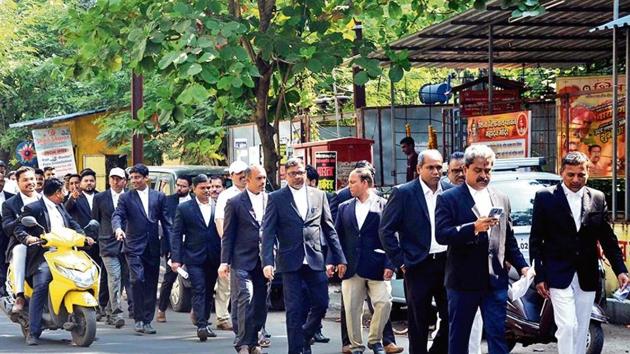Bar Council resolution forchanges in practice rules
In the wake of recent clashes between Delhi Police and lawyers in the Capital’s district courts, the council has also proposed introducing minimum qualification for candidates keen to be representatives in bar associations and councils.
The Bar Council of India (BCI), the apex regulator for legal education and also the legal profession in the country, on Friday suggested making it mandatory for law graduates to gain four years of field experience before enrolling and practising in the Supreme Court, addressing a long demand in some quarters that it makes sense to ensure any lawyer appearing in the top court has at least some experience, although some lawyers said the move could create a hierarchy in the profession.

In the wake of recent clashes between Delhi Police and lawyers in the Capital’s district courts, the council has also proposed introducing minimum qualification for candidates keen to be representatives in bar associations and councils -- a move aimed at protecting the sanctity and dignity of the profession.
A resolution to introduce the radical measures was passed by BCI on Friday in which the body said necessary changes will be made to the rules under Advocates Act – the law governing the legal profession – so that the proposals can be made effective by March 2020. The resolution also makes it compulsory for lawyers to attend continuous legal education programs to be organized by bar councils or bar associations. At present such training is voluntary but BCI intends to make it a requirement for lawyers who have to renew their licences every five years. The training program will be for those with less than 10 years of practice.
BCI’s resolution comes a day after Chief Justice of India (CJI) SA Bobde, speaking at a felicitation ceremony organized by the Supreme Court Bar Association (SCBA), said there should be some qualification for appearing before the top court.
Signed by BCI chairman Manan Kumar Mishra and co-chairmen S Prabhakaran and Ved Prakash Sharma, the resolution says law graduates must compulsorily work in district courts for two years before appearing before a high court.
Lawyers can practice in the Supreme Court only after doing so in a high court for at least two years. An experience certificate by the registrar general of a high court or the concerned high court bar association will be needed for enrolment to the Supreme Court Bar Association, the resolution said.
“The need to amend the rule has been under discussion for quite some time. BCI gave it a serious thought after CJI Bobde made the remarks at the SCBA function. These proposals will be discussed with various state bar councils, which are disciplinary body for lawyers in states, before they are finalized. The meeting (to finalise them) will be held in January 2020,” Sharma explained.
Sharma clarified that experience gained at quasi-judicial bodies such as Armed Forces Tribunal, electricity tribunal and NCLAT, will be taken into account for a lawyer who wants to graduate to high court practice. Enrolment to a high court bar association will be done only after the lawyer produces an experience certificate issued in accordance with the format BCI will prescribe. Such a certificate will be given by a lawyer having 15 years of experience.
Senior Supreme Court advocate K Vishwanathan welcomed BCI’s suggestion to introduce compulsory Continuing Legal Education. But he did not favour the compulsory two-year criterion for those who want to practice in the high court.
“The nature of practice is no longer confined to civil and criminal areas. Disputes arising in Company Law, Securities Law,Electricity Law , Telecom Law have been moved to specialised tribunals, with appeals to the Supreme Court. Practice before high courts and tribunals should be allowed immediately on enrolment,” he said.
He agreed with the move to make four years practice compulsory for those wanting to argue before Supreme Court. But he suggested that an exception be made for law graduates who want to assist lawyers and do research work. “As far as the SC is concerned , the talent of students from top law schools cannot be lost , as their legal research skills will be invaluable. Bar membership should be given to them,” Vishwanathan said.
But another senior advocate Gopal Sankaranarayanan had a different view. “I don’t agree with the suggestion of compulsory number of years of practice in any particular court. Lawyers should be allowed to start wherever and at whatever level is comfortable. Someone wanting to do Constitutional law will waste his early years in a trial court while another who is passionate about criminal trial work will be able to start at his court of choice. The skill sets are different in each court and it is surprising that the Bar Council is creating a hierarchy of lawyers. I started directly in the SC from day one and I don’t think I have done a shabby job of going about picking up experience.”
BCI also wants to have mandatory requirement for those who want to contest elections to bar associations and councils. The same will be spelled out after the regulatory body takes inputs from various state bar councils.






